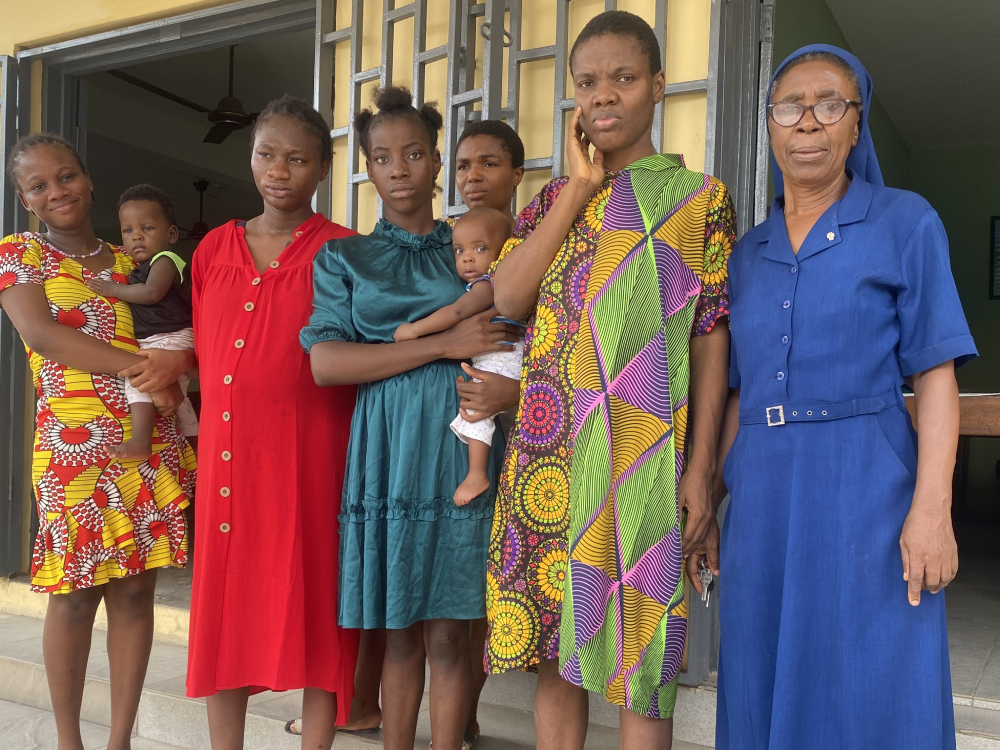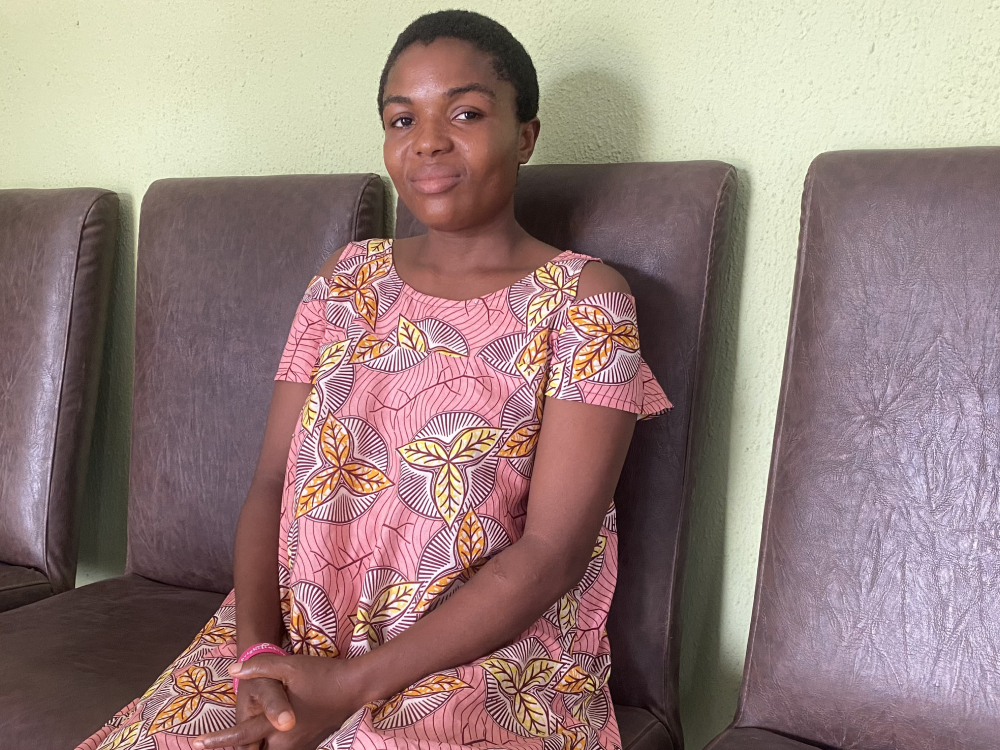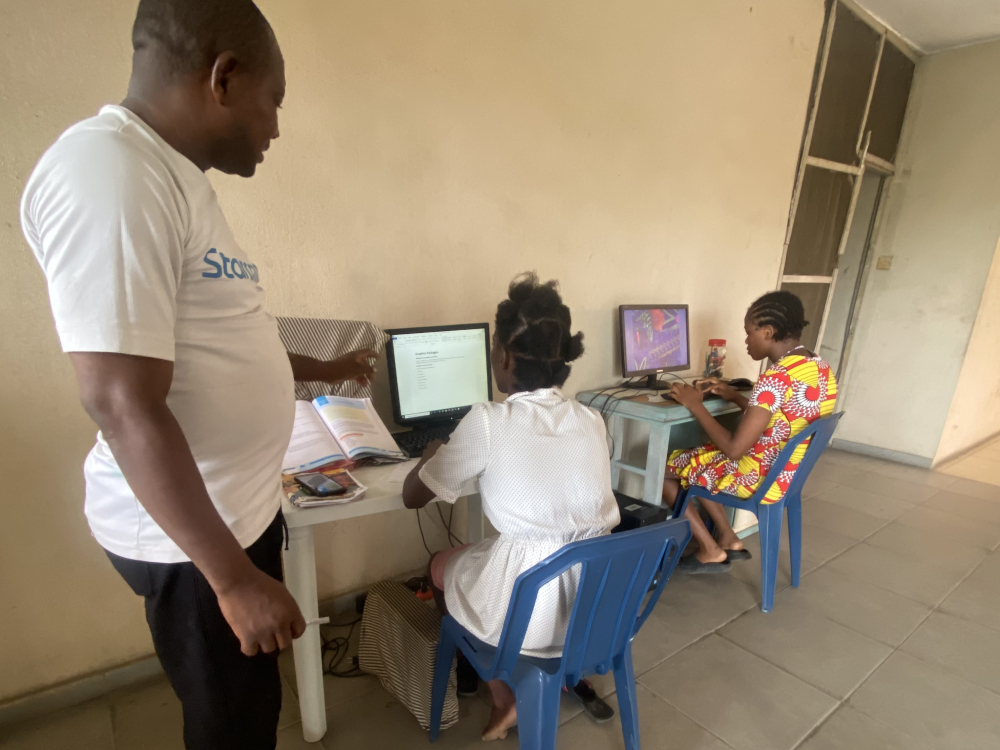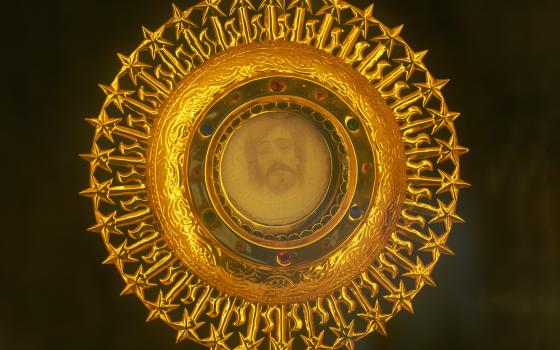
Young women and girls at the Ozanam House pose for a photo with Sr. Mary Okeke, program coordinator at the Ozanam House. (Valentine Benjamin)
Joy Iwu struggled with housing issues until she found refuge at the Ozanam House, a temporary shelter managed by the Daughters of Charity of St. Vincent de Paul in Lagos, Nigeria’s business district. Her partner, with whom she had been living in the Sangotedo area of Lagos, threw her out on the street in March 2024 after she revealed her pregnancy.
The confrontation between Iwu, 25, and her partner also led her to quit her job as a salesgirl, which only brought in a monthly income of $13.
After four months of living with a friend who could no longer accommodate her, Iwu moved out. Shortly thereafter, she met a supportive sister from her local church on Lagos Island who invited her to the Ozanam House in Ikeja, the heart of Lagos. The shelter offers assistance to young Nigerian women, many of whom are homeless and sleeping on the streets without stable accommodation.
She arrived at the shelter in June 2024 and welcomed her baby seven months later. Throughout her pregnancy, she contemplated giving her child up for adoption. However, her feelings changed.

Joy Iwu struggled with housing issues until she found refuge at the Ozanam House in Lagos, Nigeria. Her partner, with whom she had been living in the Sangotedo area of Lagos, threw her out on the street in March 2024 after she revealed her pregnancy. (Valentine Benjamin)
"I started to develop love for him. Now, I truly desire to raise him and provide him with the best education possible," she told Global Sisters Report.
She and her baby received no-cost prenatal and postnatal care, including immunizations. The Society of St. Vincent de Paul and private donors cover medical expenses for residents.
Lagos is home to about 13 million people, and Lagos State is home to approximately 22 million people and counting, as the population is growing rapidly. Over 24 million Nigerians are considered homeless, making it the country with the most homeless people in the world. The problem has worsened due to rising poverty levels and a significant housing deficit.
Sr. Mary Okeke, program coordinator at the Ozanam House, fears that homelessness will keep growing, ultimately worsening the crisis of poverty and insecurity and forcing many into crime.
She said many girls arrive in Lagos from various villages searching for better opportunities and education, but often end up in relationships that result in unwanted pregnancies. She explained that many fathers feel unprepared for marriage and pressure the young women to have an abortion.
"That's why our focus is primarily on women, particularly those who find themselves with unwanted pregnancies and lack support," she said.
Okeke works with two sisters: Sr. Pauline Ekanem, who runs the counseling unit, and Sr. Christine Uwaechie, who provides spiritual assistance. Together, they offer shelter, food and skills training in hairdressing, liquid soap making, sewing and computer skills, equipping young women to start their own businesses.

An instructor teaches basic computer knowledge to two of the seven girls at the Ozanam House. Since 1995, the home has housed over 600 girls from the streets of Lagos, Nigeria. (Valentine Benjamin)
Additionally, they offer psychological support to those who need it, preparing them for a smooth reintegration back to their families.
Ekanem told GSR that many of the girls face PTSD, depression and psychosis arising from their traumatic experiences before arriving at the shelter.
During counseling sessions, the sisters focus on self-care and open-ended questions. This allows the girls to express themselves freely, which makes it easier to identify solutions to their problems. Medication is also available to support their recovery journey.
The sisters have partnered with the International Organization for Migration, a global charity that addresses human trafficking. They also collaborate with various Nigerian government agencies, including the National Agency for the Prohibition of Trafficking in Persons, the Nigeria Immigration Service and the Lagos State Ministry of Women Affairs and Poverty Alleviation, which all help bring girls to the shelter.
The sisters at the Ozanam House also provide care and support for survivors of human trafficking rescued by the National Agency for the Prohibition of Trafficking in Persons and the International Organization for Migration.
Advertisement
Since its establishment on March 4, 1995, the Ozanam House has offered shelter to over 600 young women and girls. Currently, it houses seven residents, with a capacity of 40. Residents can stay for one year while the sisters work on their reintegration.
Iwu completed basic computer training and is ready to be reunited with her parents in Imo State, located in the southeast region of Nigeria, this April.








